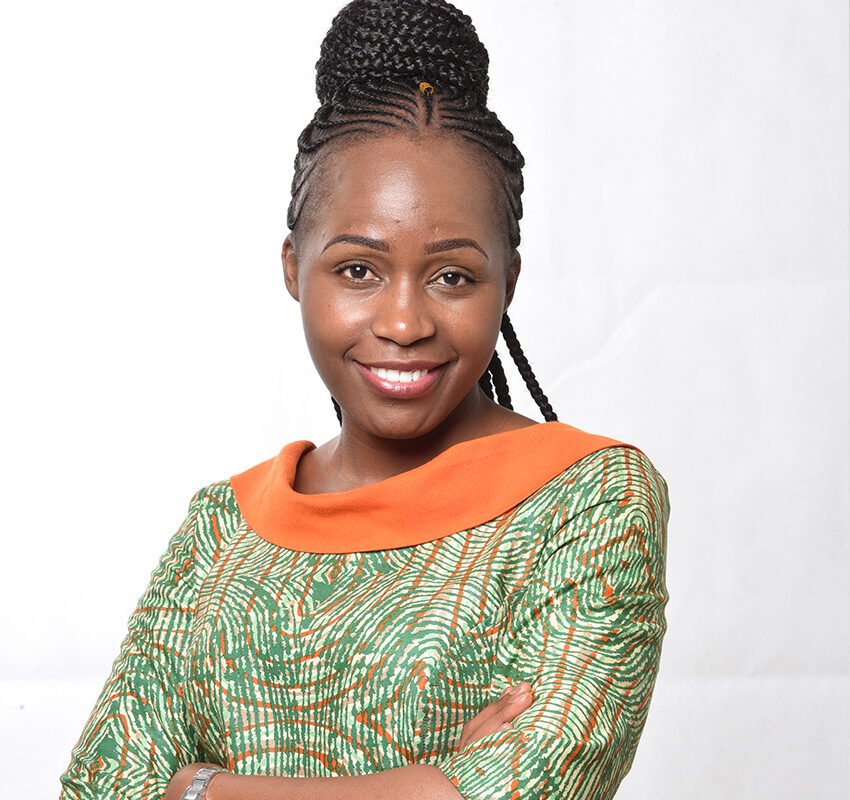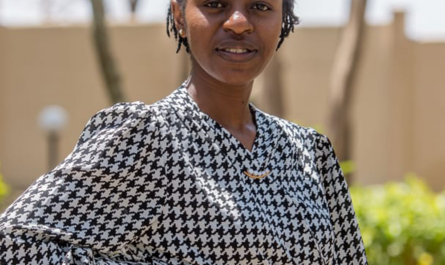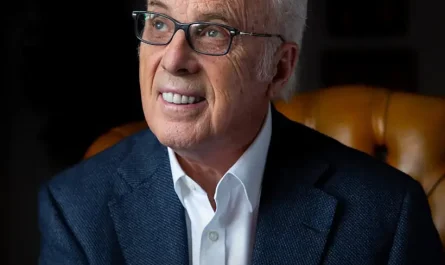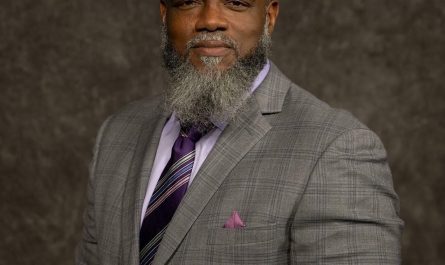Caren Wakoli loves to tell young people that their voice matters and they should speak up, even if their voice shakes. She is the founder of Emerging Leaders Foundation- Africa (ELF), an organisation working with young people to promote values-based leadership in Africa through supporting and accompanying young people to achieve meaningful, impactful and dignified participation in governance, economy and public affairs at all levels of society.
June 10, 2008 was a great day. It was the day Kenya launched its strategic development masterplan, the Kenya Vision 2030. A young woman, Caren Wakoli, had been invited to make a speech on issues facing youth in Kenya. And make a speech she did. If you have met Caren, you know how passionate and articulate she is on matters youth and leadership. So great was her delivery on this day that the late President Mwai Kibaki decided not to read his speech.
“After listening to that girl, I have decided not to read my speech. Whatever she said is what we must follow as a nation and we will be just fine,” the President said.
This could have easily been Caren’s day of glory, when she effortlessly made newspaper headlines and secured a job at State House. But when the function was done and the media was on her with microphones and cameras, amid the clamour, the voice of one woman, shouting to get Caren’s phone number, stood out: “Remember what happened there today — that’s not you; that’s God working through you. Remember that,” the woman shouted.
Something else happened that day. A plane crash in Western Kenya killed all four people on board, including Kenyan Roads minister Kipkalya Kones and Assistant Home Affairs Minister Lorna Laboso.
“The news changed; the headlines changed,” Caren remembers, grateful because just that afternoon, as journalists jostled for interviews, she had felt scared and unprepared for this instant fame and had cried to God, “I’m not ready for this. Cover me. Hide me.”
What followed after was a period of moulding or as we like to say in Kenya, undergoing character development, where God was preparing her for the work he would have her do, making her more Christlike; like David who went back to tending sheep for 15 years even after being anointed as king over Israel.
The big dream
Caren’s big dream was to create spaces for the youth in leadership. Like John Maxwell, she believes that all these things rise and fall on leadership
“Chinua Achebe said leadership is a sacred calling. People must get into it and reflect on actively. And when you discover you do not have the strength of heart and mind to commit to what it takes, to pay the sacrifice to do what it takes to lead, then just walk away,” she says.
If you listen to Caren talk about her life journey, you will see a common thread in nurturing value-based leadership and demanding accountability from leaders. Like when in primary school she wrote a letter to the district educational office complaining about a teacher who was always absent. Or when at the University of Nairobi, she helped bring together student leaders from both public and private universities across East Africa under the umbrella of the National Student Leaders Forum to provide a space where they could nurture each other.
“Money meant for students’ events would disappear, and this happened in all universities, public and private, so we came up with a movement where we would challenge each other to lead from a place of values and integrity.”
It was easy to be corrupt. She was living with her younger sister, paying her school fees, was also paying school fees for her younger siblings in high school and was supporting her parents from her HELB money and stipend as a student leader.
“I actually needed money. And here was ready money- students’ money. But I always felt that this was a calling for me; God was watching me. God had put me there to ensure the right things happen.”
A third incident that awakened a fire for Caren to mentor young people into leadership was her own ‘premature’ foray into national politics. At age 24 she attempted to run for the MP seat in her constituency, fueled by her days in campus leadership. But on the ground, it hit her that campus politics was child’s play. She didn’t make it to the nomination list and was devastated. But the experience taught her to embrace failure.
“I have learnt so much from my moments of failure than from my moments of success. Right now, whenever I am invited to speak to young people,I say, “Embrace failure”. Failure humbles you; failure makes you listen to other people. Failure is a beautiful thing,” Caren says animatedly.
Today she tells people to aspire to make as many mistakes as they can as early as they can and make them fast, but fail better.
“Here at ELF we support each other to lose the fear of failure. Fear causes us not be the best we can be. There is so much in us that God has bestowed on us but fear of, ‘oh, I will fail; oh, what will people say; oh, I could lose money’ holds us back. What is the worst that could happen? Failure is not the worst. The worst is being so afraid to fail that you fail to live.”
“Dream big. God causes you to achieve greater than you dream. Why dream small and you use the same amount of energy to dream small and big? Dream. Envision. Imagine. When you are walking with God, there is nothing absolutely impossible.”
Plugging youth
One day in 2009, when attending a NEPAD heads of state meeting in Addis Ababa to represent the youth, the vision to increase women and youth representation in decision-making spaces was birthed.
“I got into the room and there was only one woman as head of state, President Ellen Sirleaf from Liberia. The rest were men, old men. I asked myself, the continent has over 50 percent young people and women, where are these young people? I have to go back home and start a platform that mentors and nurtures young people. We need more men and women who know that leadership is about service; to lead with integrity, who understand that we leaders are just a vessel that God gets to use.”
Caren came back home convicted. She had never run an organisation before but she had lots of blind faith that this was her God-given mission and it would succeed.
In 2012, ELF was registered and Caren turned a little corner in her sitting room into an office. She says she’d wake up every day and sit down and wait for money to come in for the organisation to begin its work with the youth. And the money never came.
“Month one, month two, six months. People never came.”
One day it hit her that she doesn’t need money to mentor young people. She got up and went to the University of Nairobi where she volunteered to speak at the International Women’s Day celebrations.
“After the event, several girls came and asked if I could be there mentor. I gave them my number. Three girls followed up. We began meeting regularly for tea and talking. They kept inviting their other friends and we grew from three to five to seven.”
“I started inviting my friends to also to talk to them. We’d buy snacks and juice and walk to the Arboretum to have our session, play games, learn. Stories would be shared… people who had gone through abuse and were wondering why things were happening the way they were discovered they needed for healing. We added coaching and counselling because as leaders who are wounded, we wound other people.”
From those humble beginnings, the initiative has grown to reach over 500 young people every year.
“People call to say they have a better relationship with their parents because of what they learnt at ELF, or they got a job, or started a business,” she says oozing pride, like a mother who just saw her toddler take its first step.
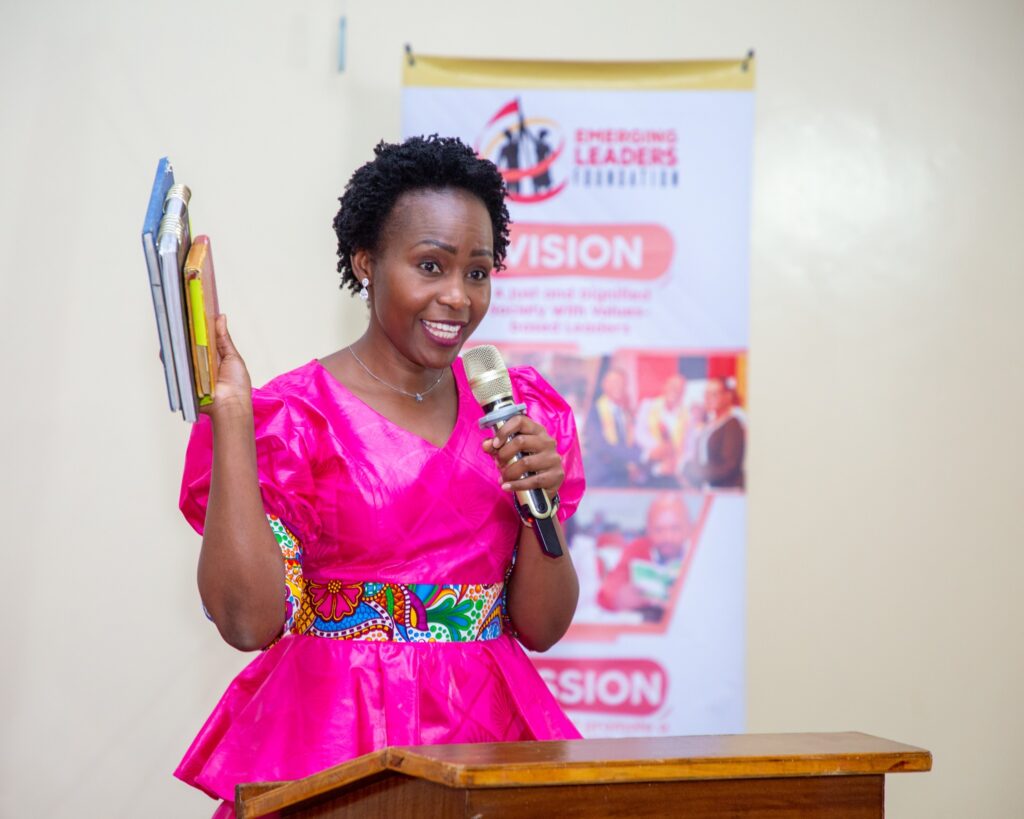
Today ELF has trained 4,366 young people, who have in turn reached another 200,000 young people across the continent, with over 100 community initiatives started in Kenya by the young people. There have been other exhilarating mountain top experiences — like when former US President Barack Obama, during a lecture at the 100th anniversary of Nelson Mandela in 2018, singled out Caren as one of the young Africans he is proud of and celebrated her work mentoring youth in Kenya.
Failing hard
But the wilderness experiences have been so great, Caren says she sometimes finds it hard to celebrate her wins.
For example, after she registered ELF in 2012, the organisation did not get any funding until 2017. Those were five years of herself pouring and pouring into an organisation without getting much out — years of burnout and almost giving up.
“I felt led by God in starting this but I failed a lot. From 2012 when we registered to 2017, I failed to raise resources. I was looking for money, pitching in competitions, writing concept notes and proposals, going for meetings with donors but none of them was coming onboard. They were saying, ‘You are too small; we need to see evidence; your theory of change doesn’t make sense; we want 10 percent of the money we’ll give you…”
“Some would ask for sex to give the money. In a span of one week, there were people asking for favours like three times. It was painful.
“I said, ‘God I need this money, but I’m also creating the foundation of this organisation to be rooted in you. I can’t be corrupt. I can’t give in to this affair to get this money.”
Things were so bad she went looking for a book to understand the connection between power, sex and money and yes, there was a book by Richard Foster going by that title.
One time in 2015 she almost gave up the dream. Someone had donated books, laptops and video equipment for the organisation but wanted an affair in return. When the affair was not forthcoming, he took back everything he had given to the organisation. It was the same year they had done around 30 proposals and nothing came out of all of them. She was spending her own money on the organisation to the point sometimes she did not have fare, rent or money for food.
“Is it possible for God to give you a vision and lead you somewhere where he knows you are going to fail?” she asks, remembering feeling bitter and let down by God.
In that period of discouragement she says she realized that this, now-very-difficult-journey, was her raison-d’etre and she was about to walk away from it, tired of giving sweat, blood and toil.
In 2017 when she was at her wits end, Ford Foundation showed up and decided to invest in ELF.
“I remember this gentleman saying, ‘Your organisation does not have processes or systems but we are going to invest in you and we hope you’ll not let us down and that you will give an example to donors that investing in young people makes a difference.
“That one year we worked! We grew to three volunteers, to four staff members, and now we are at over 20 full time staff members and eight part time members in eight counties.”
“When all this happened, I couldn’t help but think, see God.”
For leaders who are going through a wilderness period Caren has some encouragement.
“Do not stop. Keep going. Keep trying to learn different ways of executing the vision God has given you. If it means going to school, getting a mentor, getting a coach, reading books but also talking to God to give you the creativity and align you with the right people who will support you to be on that path. Do not stop, keep showing up. Sometimes you don’t know what to do, but show up. As long as you have the breath of life, tomorrow will be different. Trust the process because it is making you to be Christlike.”
